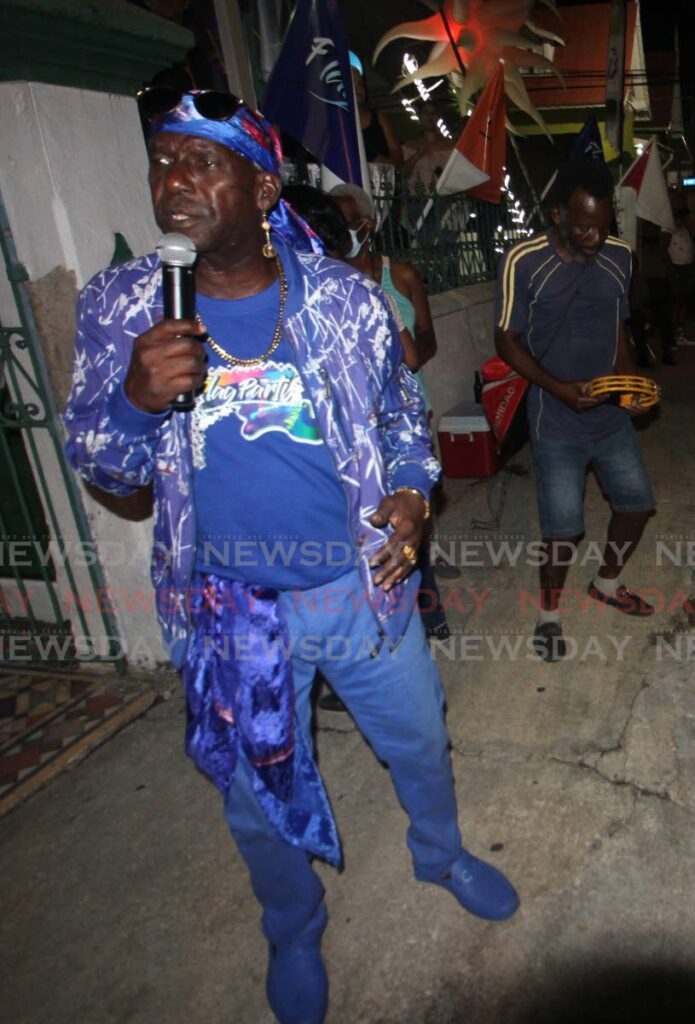Trinidad and Tobago buzzing over Scorch's top 101 soca songs

THE LAST 50 years of soca music have brought the world many hits, since Ras Shorty I created the genre in the early 1970s.
Whether it was a song that made you chip on the road behind a music truck, wave a rag in the air or simply nod your head in appreciation for a sweet melody, many people from Trinidad and Tobago, the Caribbean and the world have felt the power of soca music.
From Black Stalin to Machel Montano, Bunji Garlin to Destra Garcia, David Rudder to Alison Hinds, Mighty Shadow to Kevin Lyttle, there has been no shortage of big songs throughout the years.
On November 22, Scorch Radio took on the Herculean task of playing what it deemed the top 101 soca songs in history to kick off the 101-day countdown to Trinidad and Tobago Carnival 2025. The country was buzzing as people tuned in to hear the songs selected. One soca star also gave his thoughts on the countdown.
Top Ten
In the end, the top ten selections were:
Hot Hot Hot – Arrow (1988)
SuperBlue – Get Something and Wave (1991), Signal to Lara (1995), Bacchanal Time (1993)
Differentology – Bunji Garlin (2014)
Tempted to Touch – Rupee (2002)
Togetherness – Alison Hinds and Square One (2007)
Famalay – Machel Montano, Bunji Garlin and Skinny Fabulous (2021)
Palance – JW and Blaze (2010)
Jump – Rupee (2001)
Turn Me On – Kevin Lyttle (2003)
And coming in at position one was:
It's Carnival – Machel Montano and Destra (2003)
The Caribbean was well represented, as TT, Barbados, St Vincent and the Grenadines and Montserrat all had artistes in the top ten.

Who chose them?
The Scorch Radio team, led by CEO Kwesi "Hypa Hoppa" Hopkinson, gathered a team of 40 people with experience in music and entertainment. Some of them based locally and others from overseas.
Those making contributions were DJs Private Ryan, Travis World and DJ Adam; entertainment journalist Laura Dowrich-Phillips; music writer, reviewer and concert producer Nigel Campbell; photojournalist David Wears; and international DJs Back to Basics and DJ Spice. Members of the Stink and Dutty Committee, a group that host parties and Carnival fetes, gave input. Hopkinson, one of the founders of DJ group Radioactive in the 1990s, was also involved in the selection.
What criteria were used to pick the songs?
The selection committee chose the songs based on ten categories:
Cultural impact: Songs that have become anthems during Carnival season or that represent iconic moments in soca history often earn higher spots. Tracks that resonate deeply within Caribbean culture and remain popular over the years play a significant role.
Versatility: Some soca songs fit perfectly at both local events and international Caribbean music festivals, which speaks to their universal appeal and ability to set the tone in various settings.
Influence on genre: Songs that have influenced the sound or production style of soca for futures artistes or generations often become defining moments for the genre and score highly.
Music production: The technical brilliance of a song's arrangement, mixing and mastering can elevate its appeal. High-quality production ensures that the energy, rhythm and vibrancy of soca are delivered flawlessly.
Chart performance: Songs that performed well on charts or streaming platforms, as well as fan favourites during Carnival season, show wide-reaching popularity. Many soca hits gain attention far beyond the Caribbean, demonstrating their global appeal.
Awards and recognition: Tracks that have won significant awards, like the Soca Monarch title or Road March in TT or Barbados, demonstrate recognition from both the industry and fans.
Popularity: Songs that dominate during Carnival season and beyond, whether through widespread radio play or crowd reaction at fetes.
Danceability: Soca is inherently a high-energy genre, so songs that naturally encourage dancing, with infectious rhythms and hooks, tend to rate higher.
Relevance: Classics that have stood the test of time, staying relevant and frequently played at parties, fetes, and events even years after their release.
Lyrical content: While soca is often celebratory and lighthearted, some songs resonate for their storytelling or ability to capture the Carnival experience, island life, or social and political issues, adding depth to their appeal.
Hopkinson: A tough call
Hopkinson said it was a challenge picking a list from so many hits over the decades.
"We had a consortium of DJs who contributed – DJs, artistes, journalists; it ended up being about 40-something people who were involved in making sure (it was a strong list).
"The list was not my list. If it was my list, it would have songs that would have been included, but we decided to do more factual stuff than subjective stuff."
He explained that the criteria worked for most songs, but agreed with soca artiste Bunji Garlin that Shadow's Dingolay could have been higher.
"The position Dingolay would have been placed, compared to somebody that would have been 20 spots up, was a matter of less than point-something of a point."
The Scorch team decided to do something out of the box.
"It hasn't been done before...we were trying to do something a lil different.
"I decided to take on this task. I was surprised it was never done in this way before. Not what you feel or what you think to be number one, but actually based on a collective (effort) and a proper criteria and research."
Music writer Campbell, discussing his role in the process, said Hopkinson "wanted input. We were advising what made sense, what did not make sense, defining what the criteria should be."
Campbell, 64, said he tried to give some of the younger musical enthusiasts in the process suggestions for songs from the 1970s, 1980s and 1990s that were popular.
"We were advising them – because of our age, we told them about some of the older songs...going all the way back to Shorty and that kind of stuff."
Campbell said with music, people will always have their opinion, saying it is not like sports, where there is a clear winner and loser. "That is always going to happen. In sport it is objective: there is a winner (and) there is a loser...In the arts, it is a situation where 'I think this one better, I think that one better.' It becomes very difficult.
"But I think what he (Hopkinson) wanted to do was balance some objective measures in terms of charts and Road March wins, with the kind of passion that everybody has (for songs)."
During the countdown, DJ Private Ryan explained why a song like the fourth-ranked Palance by JW and Blaze was so high. He said it has danceability, which was one of the criteria. "For any Trini who has not left these shores and gone to see the other carnivals, Palance got so much hate because it had so much success...(but) to this day you can go Notting Hill (London), you could go America, you could go New York parties, Miami parties, everywhere – hate it or love it, when you play this song, the people will move."
Not enough love for SuperBlue, classics
Newsday columnist and cultural enthusiast Anu Lakhan was one of many who tuned in to listen to the list. She commended Scorch for the effort and initiative for the idea and delivering.
Like many people who listened, she had an opinion on what songs should have been higher or included in the top 101.
"The list in itself is a good thing," Lakhan said, "...whether it is a promotional activity for just one radio station or the fact that it gets people talking about the music is a much bigger deal...the conversation that it creates."
SuperBlue (Austin Lyons) is known as one of the most entertaining and popular soca artistes of all time. He is regarded as taking the genre to new heights with his energy and lyrics that would make any crowd move.

He made multiple appearances on the countdown, including position nine. At number nine, three SuperBlue songs were listed: Get Something and Wave, Signal to Lara and Bacchannal Time.
But Lakhan said he was not given enough respect.
"You would have seen that Machel features very heavily of course, like he should. Machel is given many spots on that list.
"Blueboy/SuperBlue also features on the list – but they did an odd thing with him. Instead of giving him multiple spots they have given him two or three spots.
"If Ras Shorty is the founding father of soca, then the engineer who built the building, who built the bridges, who built the city for it, is SuperBlue."
Lakhan was satisfied that the "Bajan Invasion" was reflected on the list. The Bajan Invasion was a period in the 1990s and early 2000s when Barbados dominated the soca scene, with Alison Hinds and Square One, Edwin Yearwood and Rupee leading the charge.
Lakhan described the list as "recency-biased." She said if picking songs had been due to "standing the test of time," some of the songs released in the last ten years should not have been placed so high.
Lakhan also felt Ras Shorty I needed to be on the list, naming the song Om Shanty Om.
The talk of the town
The countdown created a buzz in TT and around the Caribbean as people tuned in to listen to what songs were chosen.
"That was a big song," "Why that song so low?" or "I feel that song will be in the top ten" were some of the comments
made on social media such as X and Facebook during the countdown, which ran for more than five hours.
Bunji Garlin, who had songs on the list, gave credit to Scorch, but felt one song should have been higher.

"My only argument with that 101 soca list (is) this. There is no way in any world that Shadow’s Dingolay could be number 66. That song (is) one of the top 2 soca songs EVER WRITTEN, the originality alone of that track is killer," Garlin wrote on X (formerly Twitter).
Even at the TT Newsday, journalists listened to the countdown, giving their opinions on what was selected.
Speaking about the reaction from the public, Hopkinson said, "I knew it would have been something that caused a lot of reaction and emotion, so I figure we had to be really critical and clinical in what we did."

Comments
"Trinidad and Tobago buzzing over Scorch’s top 101 soca songs"